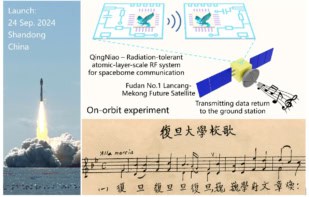Physics World‘s choice for the 2016 Book of the Year is Why String Theory? by Joseph Conlon, while Stuart Lowe and Chris North’s Cosmos: the Infographic Book of Space is Highly Commended
Abstract, mathematically complex and (so far) unsupported by direct experimental evidence, string theory attracts plenty of criticism. Yet it remains an incredibly active area of research, with thousands of physicists and mathematicians around the world working on strings and related ideas. The reasons for its continued popularity are eloquently presented in Joseph Conlon’s book Why String Theory? – Physics World‘s Book of the Year for 2016.
“String theory is much more than just a candidate theory of quantum gravity – people can use it for all sorts of reasons,” Conlon says. “Whatever your interests in physics are, it gives you things to think about.” To explain why this is, Conlon – a string theorist at the University of Oxford – begins the book by describing the origins of string theory and showing how it has changed over the years. Later chapters address the chief reasons why string theory continues to be a popular research topic. These include the theory’s status as a candidate theory of quantum gravity and the interest it poses to mathematicians, but also its applications to quantum field theory, cosmology and particle physics.
Conlon’s emphasis on string theory as something that is useful, even if it is not the ultimate “theory of everything”, is unusual in popular writing about string theory – or indeed any physical theory. This clear-eyed and distinctive approach helped Why String Theory? stand out in a strong shortlist of books that are all novel, well-written and scientifically interesting to physicists – the criteria used to determine Physics World‘s Book of the Year.
Conlon told Physics World that he wrote the book in order to “let the other side of my brain loose” after time spent writing formal scientific papers, and his dry, often acerbic wit is sometimes aimed at string theory’s advocates as well as its detractors. At one point, he describes multiverse-based thinking as “incontinence of speculation joined to constipation of experiment,” while at another he advises those who seek “proof” of a certain string theory principle that “physics is not mathematics, and those with scruples on this matter can be well advised that the math department on campus is generally in the next building down the street”.
Why String Theory? had stiff competition from the other nine books on the 2016 shortlist. Unusually, we have singled out one of these books for special recognition. Cosmos: the Infographic Book of Space has a very different format from the other books on our list, conveying information about space exploration, planetary science, cosmology and more via a series of colourful and elegant infographics. Written by Stuart Lowe and Chris North, with input from designer Mark McCormick, the book is both visually stunning and packed with fascinating ideas, and its innovative and well-executed approach earned it Highly Commended status in our competition.
To hear more about these books, you can listen to the latest Physics World podcast, in which our book experts – reviews editor Tushna Commissariat and past reviews editor Margaret Harris – discuss the winner and three other books on the 2016 shortlist with science communicator Andrew Glester, creator of the Cosmic Shed podcast.
This is the eighth year the magazine has picked a Book of the Year. Previous winners include Trespassing on Einstein’s Lawn, Amanda Gefter’s personal quest to understand the meaning of “nothing” (2015); Stuff Matters, Mark Miodownik’s salute to everyday materials science (2014); and The Strangest Man, Graham Farmelo’s landmark biography of Paul Dirac (2009).




